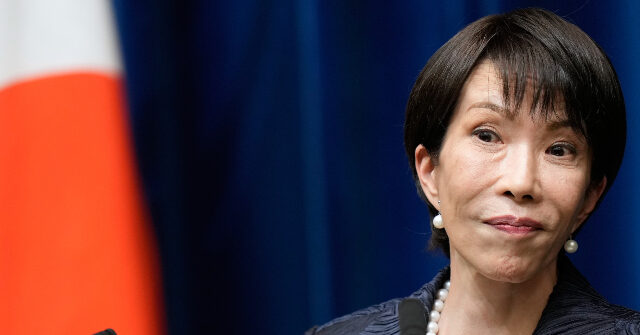
China’s Foreign Ministry insisted on Thursday that its muted response to Japan electing its first woman prime minister, hardline conservative Takaichi Sanae, was “appropriate” and it would offer nothing more than it has: browbeating her about her support for Taiwan and demands to conform to Communist Party opinions.
Takaichi formalized her ascent to the prime ministership this week after winning a close race to lead the Liberty Democratic Party (LDP), Japan’s dominant conservative party. While the LDP is highly unpopular due to various corruption scandals, the party has clung to power as a result of beneficial alliances with smaller parties of similar ideologies and the absence of any functional major left-wing party. Takaichi almost lost the mandate to become prime minister after one of those parties, Komeito, withdrew from its coalition with the LDP, but the latter secured an alliance this week with the “more hawkish” Nippon Ishin party to confirm its leadership of the country.
Takaichi is a longstanding top official within the LDP, known for her admiration of British former Prime Minister Margaret Thatcher, her close relationship with slain Japanese former Prime Minister Abe Shinzo, and her support for “hardline” conservative policies. Takaichi is expected to call for the creation of a more robust Japanese defense apparatus, aggressive economic stimulus to strengthen the economy, and closer ties to the United States. She is expected to meet with President Donald Trump at the Asia-Pacific Economic Cooperation (APEC) summit next week.
“Japan has just elected its first female Prime Minister, a highly respected person of great wisdom and strength. This is tremendous news for the incredible people of Japan. Congratulations to all!” Trump said in a statement in early October following Takaichi’s election to lead the LDP, which effectively guaranteed her the prime ministership.
Following the confirmation of her prime ministership on Tuesday, Chinese Foreign Ministry spokesman Guo Jiakun offered an unenthusiastic statement in response.
“China noted the result of the vote and considers it Japan’s internal affair,” Guo said, offering no congratulations or well wishes.
“We hope Japan will work with China, observe the principles laid down in the four political documents between the two countries,” he continued, “honor its political commitments on major issues concerning history and Taiwan, uphold the political foundation of the bilateral relationship, and fully advance the China-Japan strategic relationship of mutual benefit.”
Guo was once again asked about Takaichi during his regular Foreign Ministry briefing on Thursday. According to the state-run Global Times, he responded that China’s statement and lack of celebration was diplomatically appropriate.
“Chinese Foreign Ministry spokesperson Guo Jiakun said on Thursday that China has made appropriate arrangements in accordance with diplomatic norms,” the regime newspaper relayed, “and added that China and Japan are close neighbors, and China’s basic position on China-Japan relations has always been consistent and clear.”
“The spokesperson also expressed hope that Japan will work with China in the same direction, adhere to the principles set out in the four political documents between the two countries,” it added, “and honor its political commitments on major issues such as history and Taiwan.”
The Chinese Communist Party appears to be especially alarmed by Takaichi’s support of Taiwan. Taiwan is a sovereign, democratic country off the coast of China, but the Communist Party has insisted for decades, falsely, that it is a “province” of China under the rightful rule of Beijing. It has failed to exert any political power on the island despite these claims, though Beijing uses its prodigious geopolitical leverage to keep Taiwan out of the United Nations and other key venues.
In 2021, during her last attempt to run for the LDP leadership, Takaichi held a phone call with Taiwanese President Tsai Ing-wen. Due to China’s “one-China principle,” which forbids countries from having diplomatic ties to Beijing if they recognize Taiwan as a country, Japan has no formal relations with Taipei. China thus considers any communication with its elected president, who Beijing deems a “separatist” leader, a provocation. Takaichi spoke to Tsai, a Taiwanese president particularly hated in Beijing, for about half an hour and indicated she hoped to expand defense ties with Taiwan.
Takaichi also said at the time that she would continue to visit and honor the Yasukuni Shrine, a site of particular controversy for China. The shrine honors Japan’s dead soldiers, which include many who fought and committed atrocities in World War II. Defenders of the shrine note that it was established in 1869, long before World War II, and thus is a more general site to honor Japan’s soldiers.
“The Yasukuni Shrine is a spiritual tool and symbol of Japanese militarists responsible for the war of aggression,” Chinese Foreign Ministry spokesman Lin Jian declared in remarks on October 17, when asked about Takaichi sending a monetary offering to mark the autumn festival.
“We urge Japan to face squarely and reflect on its history of aggression, be prudent on historical issues such as the Yasukuni Shrine, make a clean break with militarism,” Lin ranted, “stick to the path of peaceful development, and earn the trust of its Asian neighbors and the international community through real actions.”

